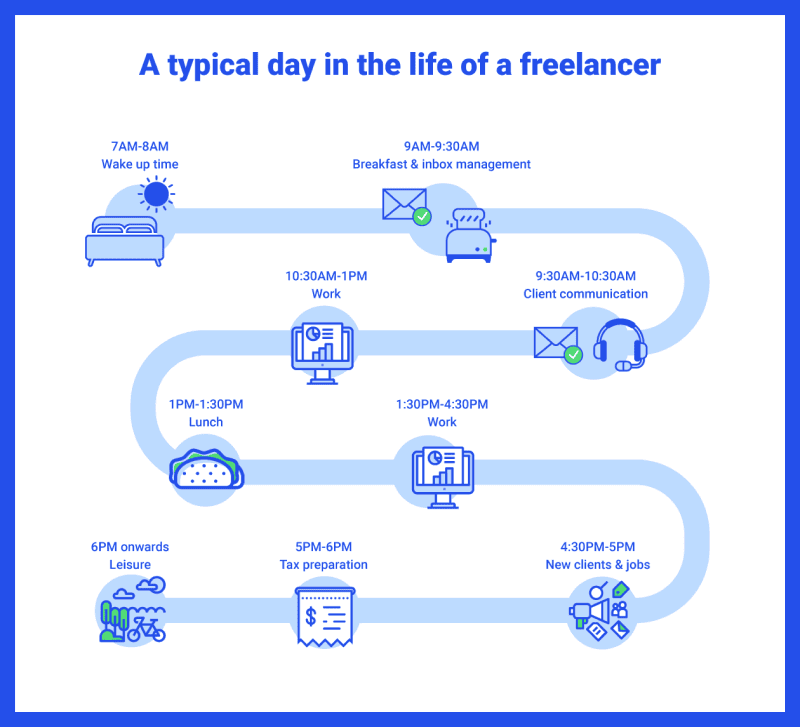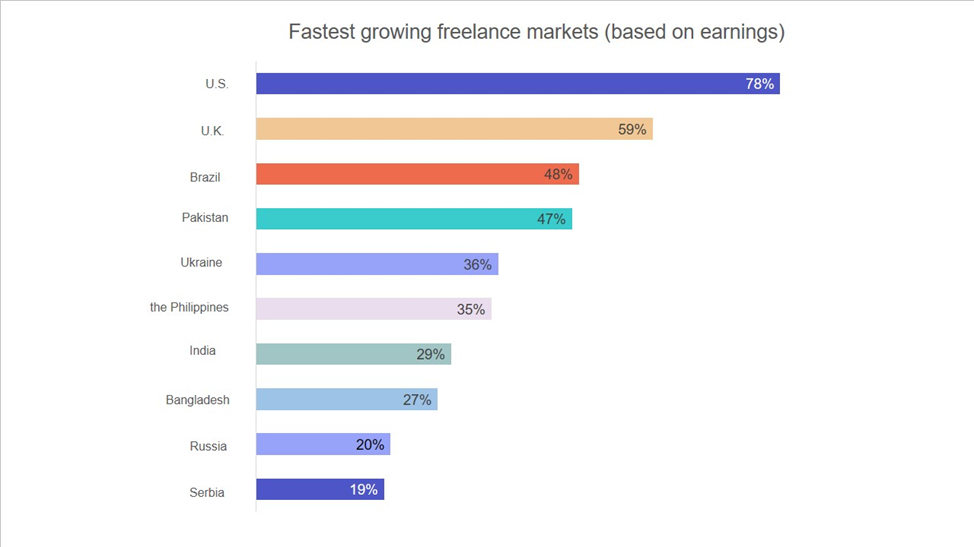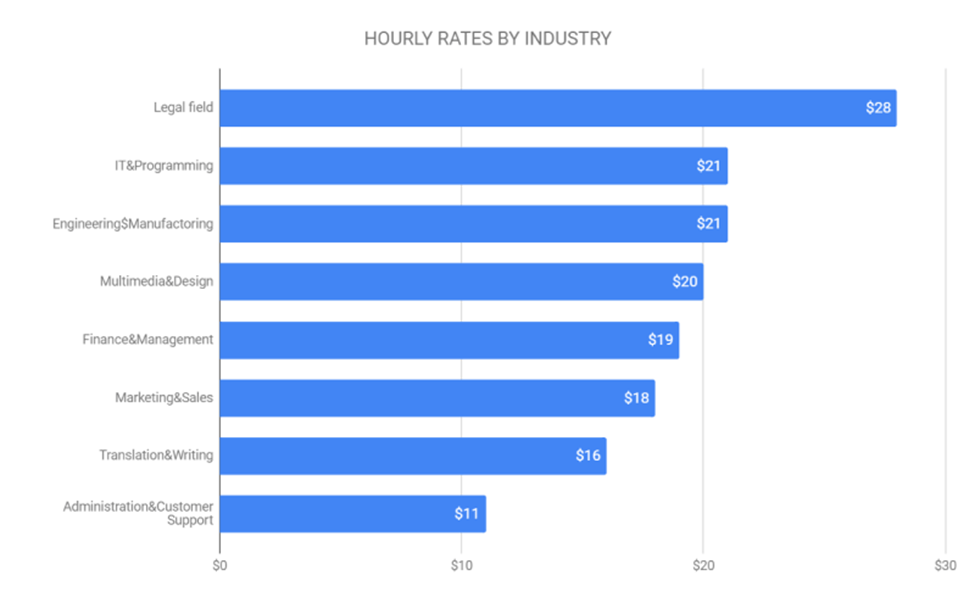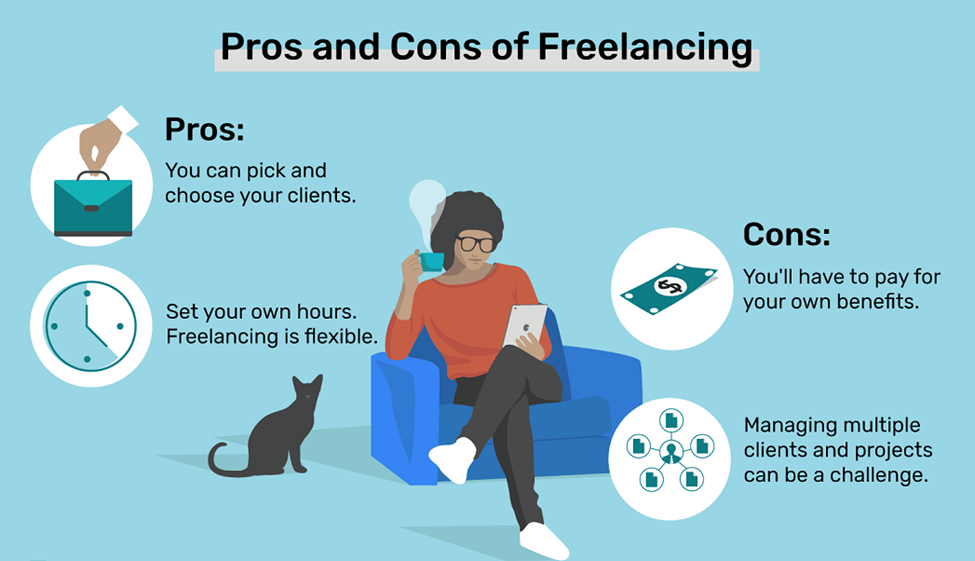
Table of Contents
- What Is the Meaning of Freelancing?
- Other Terms for Freelancing
- What Does “Freelance” Mean?
- What Is Freelancing, and How Does it Work?
- How Much Can You Earn While Freelancing?
- What Are the Pros of Freelancing?
- What Are the Risks Associated With Freelancing?
- 3 Ways to Freelance Effectively
- Key Takeaways
- Conclusion
- FAQs
Currently, about a billion people are working as freelancers around the world. That’s a staggering statistic, isn’t it? But a lot of you may be wondering: what is freelancing, and how does it work? In this article, we talk all about freelancing: from how it works to who should opt for it.

A freelancer works as a self-governing contractor and offers services for a fee, with usually no expectation of a permanent single client. Freelancers are typically hired by other companies on a long-term or short-term basis. Freelancers do not receive the same compensation or benefits as full-time employees, but neither do they have the same level of commitment to any specific company.
What Is the Meaning of Freelancing?
Freelancing means to work as an independent entity, and not be employed under someone else. In other words, freelancers have the liberty to work on a variety of projects for different clients, at the same time. Also, freelancers can work from anywhere in the world, but given the COVID-19 pandemic, it primarily involves working from home. Freelancing is feasible for many, especially those who are in their early 20s. It is, in fact, one of the best things that you can do to create a set of marketable skills, gain financial independence, and achieve clarity about your professional goals.
Other Terms for Freelancing
Essentially, freelancing means being your own boss. Freelancers use several terminologies to describe the work that they do. Here, we will acquaint you with the different terms related to freelancing that you must know about.
- Contractual jobs
These include short-term or part-time jobs a freelancer may opt for.
- Contract-to-hire
Sometimes freelancers want to switch gears and work as full-time employees. In that case, they can opt for contract-to-hire roles, where they have to work for a trial period before they are hired full-time.
- Gig-worker
A common term associated with the freelance market is the gig economy. Essentially, it refers to taking on different jobs, or rather, “gigs” for different companies as a part-time employee.
What Does “Freelance” Mean?
Currently, the term freelancing is used to describe a self-employed person. However, in the past, the term had slightly different interpretations. “Free” is derived from a Germanic word that means “to love”, and “lance” is a French word that means “to launch”. Its origins are believed to lie in the 1800s when it was used to refer to French and Italian mercenaries who would fight for anyone willing to pay them. From the Middle Ages, through to the Renaissance period, these “free lances” were hired by feudal lords and noblemen who wanted military help.
The word freelance quickly gained acceptance, as well as broader meanings. Freelancers also started being referred to as people who would do any type of work on their own terms and without a long-term commitment to any one employer.
What Is Freelancing, and How Does it Work?
Now that you know what freelancing means, it’s time to understand how it actually works.
For some people, freelancing is a full-time occupation. They do it just like they would do any other regular job. For others, freelancing is just a way to acquire additional income.
Freelancers can work directly with their clients to offer services. Additionally, many online communities and platforms enable freelancers to score different types of projects. Some freelancers focus on specific areas of business or industries, while others offer more generic services to their clients.
When you provide freelance services, you get paid for the project. Once the project is over, you accept the payment and move on to the next project. For instance, if you are a freelance copywriter and a company hires you to write content for its marketing campaign, you can provide your copywriting expertise for a single project, and that would be the end of it.
Certain companies pay freelancers to work for a specific number of hours every week or month. Often, this arrangement is referred to as a “retainer”. A lot of freelance professionals use this approach to work. They fix a monthly amount in exchange for their services.
According to CNBC, the rise in the adoption of remote teams has made freelancing a viable career move for many skilled professionals. Below are the top 10 countries with the fastest-growing incomes for freelancers.
Freelancers, today, are performing a wide variety of roles. Some of the most common fields for freelancers are as follows:
- Copywriting
- Content writing and marketing
- Graphic designing
- Web development and design
- Project management
- IT support
- Social media management
- Teaching and tutoring
- Content and video editing
- Accounting and bookkeeping
- Translation services
- Software development
- Data entry
- Medical transcription
- Customer support
- Technical support
Several companies depend on the services of freelancers to keep their costs low, while managing a rapid rise in projects. Even government organizations and nonprofits are using freelance services to meet their temporary and ongoing project requirements.

How Much Can You Earn While Freelancing?
Many factors determine freelance rates. Some of the most significant ones include the industry, the freelancer’s skill and level of expertise, relevant experience, location, and qualifications.
According to a survey, an average freelance writer makes around $31 per hour. However, this number can vary depending on the complexity level of the project involved. Freelance software engineers, for instance, can easily make around $70-$80 per hour.
Here are the average hourly freelance rates for eight prominent industries (as of 2021).

It is advisable to compare freelance rates in a particular industry to get a fair estimate of the expected income you can earn as a freelancer.
What Are the Pros of Freelancing?
When it comes to understanding all about freelancing, most people want to know what advantages it has. To begin with, freelancing offers a lot of flexibility and control. For instance, freelancers have the freedom to choose their own working hours, the clients they wish to work with, the kind of projects they want to take up, etc.
Additionally, freelancers also have complete control over their income. They do not have any fixed salary structure, and can earn as much as possible. Depending on the level of expertise, most freelancers end up making great money by working part-time hours.
With freelancing, remote work is also a major perk. Most of the time, freelance projects involve working at your home office during your chosen hours. There is also a lot of variety in the type of work you can do. If you have an interest in multiple fields, you can easily explore all kinds of projects and industries, without having to fixate on a particular job.
Often, it is seen that people don’t keep doing freelancing all their life. They either hire other freelancers to work under them or go back to working as a full-time employee. But in the meantime, freelancing is a great option, as it provides adequate time for you to figure out how you wish to proceed in your career.
What Are the Risks Associated With Freelancing?
Merely knowing all about freelancing is not enough, You also need to consider the associated risks.

Freelancing is often associated with inconsistent and unstable pay. In this field, making money largely depends on the kinds of projects you are able to score. Often, there is no secure feeling of knowing that a fixed amount of income is going to hit your bank account at the end of the month. Having too much or too little money becomes a part of your life as a freelancer.
Another significant risk associated with freelancing is that you have to manage everything on your own. From filing invoices and taxes to taking care of your health and even purchasing the technology to complete a project: everything has to be tackled on your own. And since you are on your own, there is typically no comfort of bonuses, paid leaves, and many other benefits that come from working full-time with an organization.
Some freelancers also find it difficult to strike a work-life balance. All these risks are manageable, but you must know about them when looking for an answer to this question: “What is freelancing, and how does it work?”
3 Ways to Freelance Effectively
What is freelancing? Simply knowing the answer to this question is not enough. You must also know where to start. Broadly, there are three ways to make money as a freelancer. Let’s look at each one of them in detail.
1. Working directly with clients
One way to freelance is to work directly with clients, without the participation of any middlemen. A freelancer may come in contact with a client through networking platforms, existing relationships, or word-of-mouth referrals.
This is a great way to score projects and enjoy good margins. However, it may be slightly tough, especially for newbie freelancers. But once you form good relationships with a client, it becomes easy to land long-term projects.
2. Subcontracting
Some freelancers only specialize in specific areas, and for them, subcontracting is a great option. Now you may ask, what is freelance work through subcontracting?
Well, it’s pretty straightforward. Several companies acquire big projects from clients and break them into different parts. Some of these parts are completed by the company’s full-time employees, whereas some parts of the project are subcontracted to freelancers.
For example, a company gets a full website development project that is done in-house. However, the website copywriting part is subcontracted to a professional freelance copywriter outside the agency. This is an effective way for freelancers to get a good amount of work and avoid having to deal with the clients directly.
3. Job portals
Another excellent way of acquiring freelance projects is through freelance marketplaces. There are many online job posting sites and platforms that enable freelancers to score gigs or work opportunities. Essentially, these portals aggregate freelance working opportunities and match them to the right freelance talent. You can easily register on these portals and view job postings made by different companies.
Some of the best freelance job portals include websites like Upwork, Fiverr, FlexJobs, and SolidGigs. Although most of these websites have heavy competition, scoring a good gig becomes relatively easier with time. Once you build a strong reputation on the platform, you can find regular work without having to look too hard.
Key Takeaways
- Freelancing means to be one’s own boss. Whether you take up freelancing as a full-time career option or simply as a side hustle, it can prove to be lucrative.
- There are many types of freelance jobs. Also, an increasing number of organizations are wanting to work with freelancers now.
- Freelancing is a great way to work on your own terms. However, it also comes with its risks, especially in terms of income stability and work pressure.
- You can freelance work opportunities, either directly working with clients, subcontracting, or via job marketplaces.
- To succeed as a freelancer, you must build a portfolio to showcase your skills, promote your services on freelance websites and social media, make a persuasive pitch, and research pricing.
Conclusion
We hope this blog addressed all your queries regarding the question, “What is freelancing?” The information will help you determine if it is the right fit for your professional aspirations.
Freelancing surely has its pros and cons. The greatest pros include flexibility, control, and a variety of work opportunities.
However, if you are someone who prefers a stable paycheck and consistent levels of work, freelancing may not be the best bet for you. To succeed as a freelancer, you need strong communication skills to market yourself to the clients out there. You also need a high level of self-motivation to stay devoted and meet strict deadlines.

FAQs
Freelancing means to be one’s own boss. Freelancers are hired by companies for a specific project or service for their clients. Freelancers are not committed to any one organization. They can work on multiple projects for multiple companies, at the same time.
Freelancing is a profession, wherein a person works as a designer, writer, performer, and the like. They sell their services to different clients or companies, and charge by the hour or on a project basis.
Yes, freelancers get paid. They can choose to charge companies by the hour, or on a project-basis. Some freelancers also prefer to work with a fixed income per month.
School or college students, or any other professional who wants to earn some extra money, can do freelancing. It is one of the best ways to earn money while working on your own terms.
Marketing, communication skills, time management, project management, creativity, social media skills, and negotiation skills, are some prerequisites of freelancing.
Freelancing has no requirements. All you need is a marketable skill, the right communication ability, and dedication to work hard and adhere to deadlines.
Latest Blogs
Explore how Google’s 2025 AI search updates triggered ranking chaos. Learn actionable strategies to adapt your SEO for AI Overviews, zero-click searches, and SERP volatility. Stay ahead now.
Learn how to rank on AI search engines like ChatGPT, Perplexity, and Gemini by optimizing your content for authority, structure, and relevance. Stay ahead in AI-driven search with this strategic guide.
Explore the best healthcare SEO services for your medical practice. Improve online visibility and effectively reach more patients in need of your services.
Get your hands on the latest news!
Similar Posts

Freelancing 101
5 mins read
11 Resources For Designers to Find Freelance Jobs Online

Freelancing 101
6 mins read
30 Freelance Industry Statistics to Get You Started

Freelancing 101
5 mins read